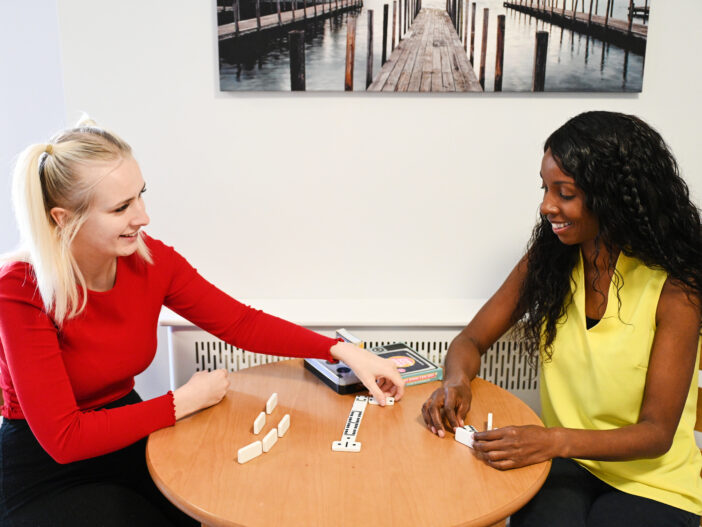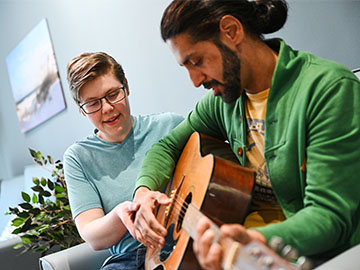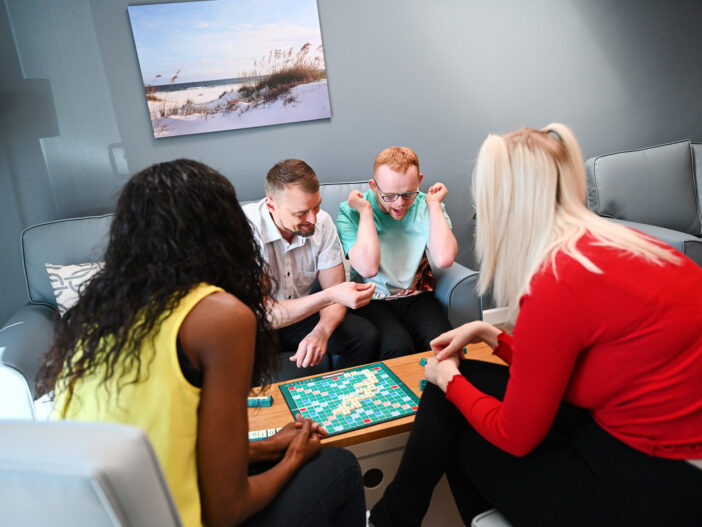Celebrate the small wins along your journey
Vicki Bennett is one of our Brain Injury Rehabilitation Operations Managers at Voyage Care. Having worked at Voyage Care since 2009, below she shares a personal blog about why it is so important to celebrate the small wins throughout your brain injury journey…
Normally when people talk about brain injury rehabilitation success, they focus on larger pathway steps, such as moving out of a residential care home into community-based support. But trust me, it’s just as important to celebrate every move in the right direction, no matter how small they may seem!
At Voyage Care, we believe the day-to-day achievements deserve celebration too, like making a cuppa. Did you know, there can be over 20 different brain interactions that take place when you make a cup of tea? If you’ve had a brain injury and need to relearn how to do this, it might feel like an impossible task. And it could take a month or years to do, depending on the individual’s insight, determination and current capability. If you then made that cup of tea, wouldn’t that feel like an accomplishment?
A consistent approach
I’ve worked in the care industry for over 13 years and it’s always very humbling to see what the people we support achieve. Recently, one of the people we support at our brain injury rehabilitation service, Markham House, recognised his mum. This might not seem like a big deal, but it took five years of continuous hard work to reach that point. Plus, it meant the world to his mum.
Achieving smaller steps like these add up to those huge leaps, but it takes a lot of planning and a consistent approach. In this example, we kept the journey of visiting his mum exactly the same every week. This even included stopping at the same service station, using the same toilet cubicle and sitting at the same McDonalds table.
This could present some tricky conversations, especially if the table was occupied…but it was worth it! Reinforcing the same routine helped him relate the journey to seeing somebody he cared about and ultimately recognising she was his mum.
Another example is learning to eat independently again. For this to happen, the brain must relearn co-ordination for things we take for granted, such as opening your mouth when the spoon is at your lips.
This is a long process and has multiple stages, including strength building, guiding movements though prompting, getting used to the movement and, of course, repetition!
For me, it’s personal
I have a personal connection to the work I do as my dad obtained a brain injury, so I understand how tough it is to see your loved one embark on a journey they never volunteered to go on.
For me, it wasn’t him coming home that felt like he was progress, but something else. My dad’s long-term memory wasn’t affected but unfortunately his short-term memory was. So, if the front door was knocked, he would forget why he was walking by the time he reached the hallway.
Through association and retention-focussed activities, one day he reached the door and remembered the reason why. It was wonderful to see that glimpse of progress and it gave me hope that he was on his way to rehabilitation. Gradually, and through consistent work, he recognised our younger family members and retained conversations that were had.
Celebrate the steps
Seeing your loved one with a brain injury can like you’re lost in a large, scary forest and you’ll never find your path back. As part of human nature, we make comparisons to others around us but it’s critical to recognise that no two people are the same and therefore, no two rehabilitation journeys are the same. They are as unique as the person and ultimately, it takes time.
As we head into a new year, I think it’s important to remember that sometimes, smaller achievements can outweigh larger achievements. Setting and achieving a goal is a step closer to living the life you deserve, regardless how small that goal might seem.
Find out more
To find out more about our brain injury rehabilitation support, please visit our brain injury rehab pages.

 Views
Views 

